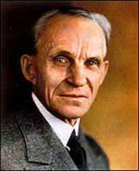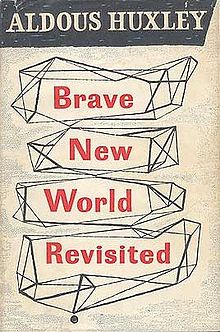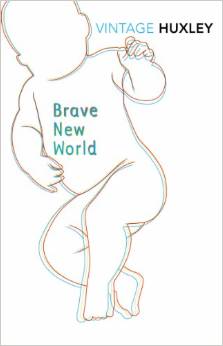 Henry Ford
Henry Ford Synopsis:
The book is set in the year in the year of Our Ford 632; 632 years after Henry Ford created the first mass produced car, the Model T, and so became the deity of humanity. The novel describes a community based on the principles “community, identity and stability” in which families have been eliminated and citizens are both physiologically and psychologically conditioned to accept their position in society with pleasure. They are born in hatcheries into a pre-determined caste system and all children are educated using the “hypnopaedic process”, a system which provides each child with subconscious messages to mold the child’s lifelong self-image and social outlook. Citizens are encouraged to value consumption with platitudes such as “ending is better than mending” and as a result employment is near 100%. People are given the drug Soma, a relaxant and hallucinogen which sends people on “holidays” from the discomforts of life. Rather than have families, casual sex is encouraged and monogamy or celibacy is anathema.
History
The work was published in 1932 in the wake of World War One, but before the totalitarianism of Nazi Germany and the Soviet union that inspired another dystopian novel, Nineteen Eighty-Four. It was highly influenced by the discoveries of behaviourists and psychologists such as Watson, Skinner and Freud. It also came before the discovery of DNA and so focuses on the mind and physiology and not genetics as the way that society orders it citizens.
Aldous Huxley wrote the book as an antidote to H. G. Wells’ utopian novels Modern Utopia (1905) and Men like Gods (1923). Wells wrote books which highlighted the positive future possibilities for mankind, whilst Huxley provides a frightening vision of the future.

- Reproductive technologies
- Genetic engineering
- Misuse of psychological conditioning
- Suffering balanced by drug taking
- Identity of self vs society
- Society and Class
- The use of technology to control society
- The dangers of a consumer society
- Sex, promiscuity and monogamy
- The incompatibility of happiness and truth
- The dangers of an all-powerful state
Questions to discuss:
- It has been suggested that, as Brave New World is primarily a novel of ideas, the characters are unconvincing and merely symbolic. Do you agree?
- The World State aims to eliminate emotional partnerships and the notion of the family - why is this?
- How many of Huxley’s prediction now look prophetic? Which major aspects of progress did he fail to anticipate?
- “Everybody’s happy now”: to what extent is this true of the World State?
- Would you rather live in Huxley’s London or the Savage Reservation?
Suggested further reading:
- Nineteen Eighty-Four by George Orwell - an alternative distopian novel that focuses on a totalitarian state that controls people by inflicting pain rather than Wells’ world which controls inflicting pleasure.
- The Handmaid’s Tale by Margaret Atwood - a feminist take on a distopian future that exmaines many of the same themes.
- Men like Gods by H. G. Wells - the utopian novel that Huxley wanted to counter.
- The Tempest by William Shakespere - the inspiration behind the title and often quoted by John the Savage.
- Brave New World Revisited by Aldous Huxley - his reflection on his novel in 1958 and the extent to which the modern world resembles his novel.


 RSS Feed
RSS Feed
